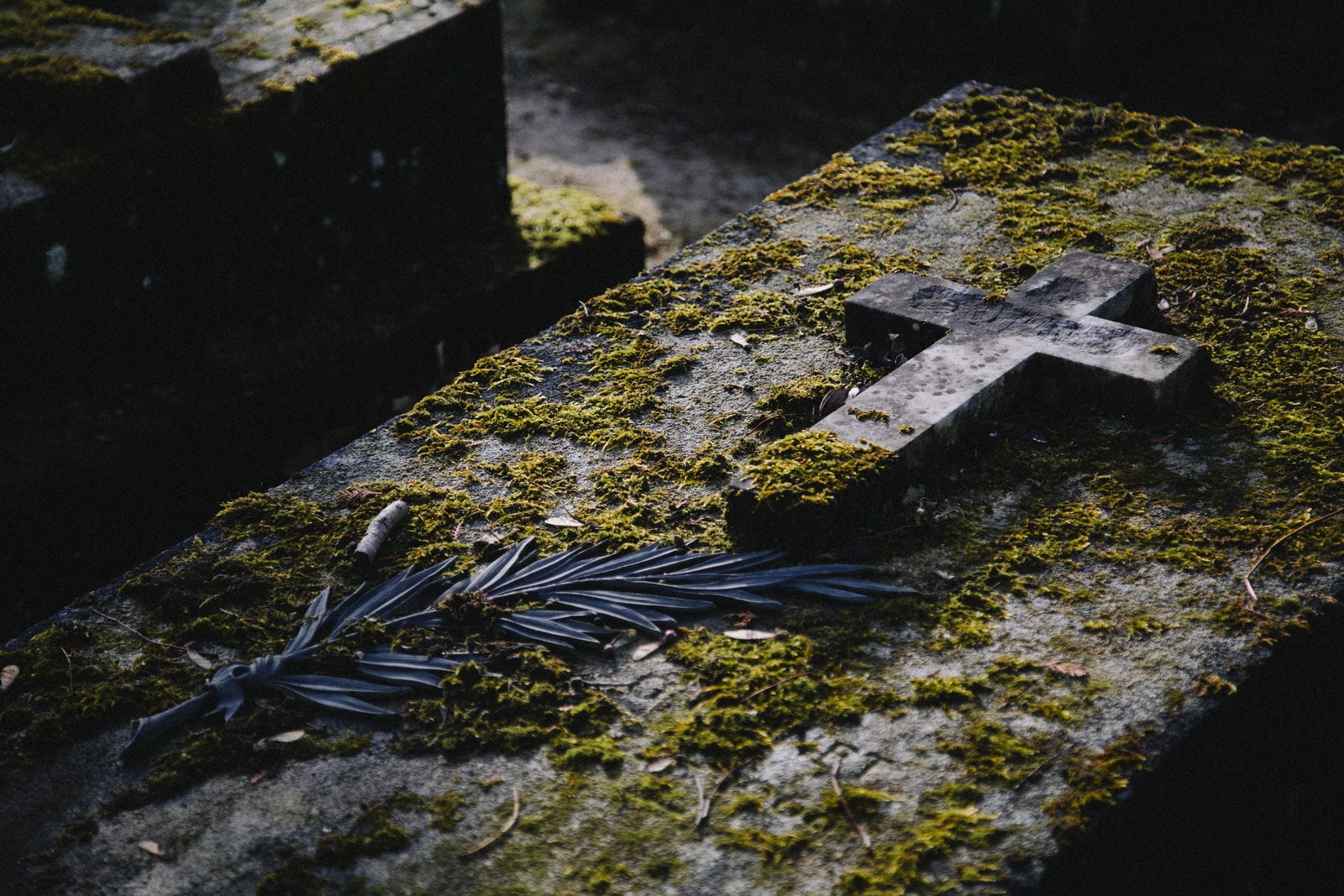Christian faith invites you into a new life in Christ. But faith in Christ doesn’t take away the grief we feel when loved ones pass away. And many of us still find ourselves afraid of facing death. You may wonder what will happen to your soul when you die. What might life after death be like? Will you go to heaven? And is going to heaven ultimately our Christian hope in the face of death? Or is there more to the story? What about the promise that Jesus will return to earth–the second coming of Christ?
In this article, professor and Reformed theologian Dr. J. Todd Billings explores what the resurrection of Christ means for how we think about life after death and where we can find Christian hope when we face death.
The article includes material from the book The End of the Christian Life: How Embracing Our Mortality Frees Us to Truly Live by J. Todd Billings (© 2020 Brazos Press, a division of Baker Publishing Group, www.bakerpublishinggroup.com). Used by permission.
My college’s winter break had just finished, but winter had not. I squinted at the red tail lights ahead, but it was hard to see beyond the blanket of soft, wet snow covering my windshield. Warm, dry air surged out of my heater. Squeaky wipers swung back and forth. Then a truck barreled past on my left. I pushed down the gas pedal slightly. I didn’t want to get run over because of my slow speed.
But then I was moving too quickly toward the red lights of vehicles in front of me. My foot pushed the brake pedal hard, and I could feel my front-wheel-drive Honda Civic twist and then spin in a circle as my locked wheels skated across the road. No traction on this snow and ice.
My entire life didn’t flash in front of my eyes, but a single thought gripped my tightened body: It should not end this way! A few hours earlier, I had been talking to friends about my plans for the future, how that related to what I was studying in college, and when I would see my family next. But as I spun across the road, those stories were threatened. The logic of the quick “not end this way!” seemed to be: “My stories don’t fit this ending. The stories of my education and friendships and family would become nonsense if I died this way.”
Why we crave a more satisfying resolution to the story
In our day-to-day lives as students, as daughters and sons, as workers, as friends, we assume that our story’s end will somehow make sense, that it will not be incoherent, like shards of broken glass scattered randomly across the terrain of our life. It should not end this way. To muster the courage to live, and love, and learn each day, we need more than senseless stories.
We want more than a broken ending. Imagine attending a baseball game at Dodger Stadium and hearing “The Star-Spangled Banner” sung by a soloist who stops with the words “o’er the land of the—.” The song moves from what musicologists call the “home key” to heightened levels of tension and variation. But then, intuitively, the song returns to the home key. If this return were lacking, the fans would probably sing the resolution (“free and the home of the brave”) themselves. We are deeply wired to desire an ending with resolution.
Sometimes, though, the music stops before reaching home. When Harvard professor James Kugel was diagnosed with an aggressive form of cancer, he had the sense that “the background music had suddenly stopped.” This background music, he says, was “the music of daily life that’s constantly going, the music of infinite time and possibilities. Now suddenly it was gone, replaced by nothing, just silence.” This silence reminds us that we are small and dispensable.
For Christians, the unsettling reality of broken endings does not simply go away because of Christ’s victory. We may hear the apostle Paul’s words touted at Grandma’s funeral: “Death has been swallowed up in victory.” Amen. This is a central Christian confession. But this cosmic turnaround has not yet happened—not even for Grandma, who has already died and is with the Lord.
The return of Christ: Act II of the resurrection
Paul writes this sentence in a famous chapter in 1 Corinthians 15, teaching how the resurrection of Christ is not only the ground for our salvation from sin, but our only hope for death not having the final word: [For] “if Christ has not been raised, your faith is futile and you are still in your sins” (1 Corinthians 15:17). Yet, because “in fact Christ has been raised from the dead,” then we are right to hope that “at his coming those who belong to Christ” will be raised as well (1 Corinthians 15:20, 23).
Thus, when we come to the glorious declaration that was proclaimed at Grandma’s funeral, we can see that even the verb tense points to this great reality that the risen Christ will bring when he appears to us in bodily form again: “When this perishable body puts on imperishability, and this mortal body puts on immortality, then the saying that is written will be fulfilled: ‘Death has been swallowed up in victory’” (1 Corinthians 15:54, italics added).
In the words of the Apostles’ Creed, Christ will “come again to judge the living and the dead” and bring about the consummation of his kingdom. At that point, he will set right our broken and aching creation, cleanse the cosmos, and the resurrected will dwell with God and with the rest of creation in fullness. Then death will be fully swallowed up in victory. We have a steady promise from God that this will take place, but it hasn’t happened yet. Death will not be dead until the glory of the Lord in the temple is spread across the whole of creation. And that hasn’t happened yet, not even for Grandma.
If this sounds unfamiliar, it is likely because in the popular Christian modern imagination, we often adopt a one-stage approach to life after death. A Christian dies and is whisked away to heaven—end of story. But, in contrast, the Bible and the historic Christian tradition have a two-stage hope about the end.
Related: What Does the Bible Say about Life after Death and the Resurrection of the Body?
After Grandma dies, she is no longer in pain and is in fellowship with Christ. Yet she also awaits the great drama to come—the final day, when Christ returns to bring the kingdom in fullness, when the dead will rise in new bodies, when every knee in heaven and on earth will bow to Jesus Christ. This is the heart of it all: the drama of the renewal of all creation, when heaven and earth are reunited and the Lord dwells with his creatures as in a temple.
This is a great and expansive hope. Yet it doesn’t cover over the unsettling questions presented to us by the broken endings we see and experience now. The moments of each day are meaningful to us because they are connected by a story. But since death is not yet dead, this tapestry of meaning can be torn when death cuts into our story.
Dying, as a final earthly chapter, is something that happens to us; it’s not a chapter we write ourselves. And the loved ones left behind are often left with open questions and raw wounds, challenged to make sense of their ongoing life in new ways.
Facing death with Christian hope
As mortals, death is something that breaks in, something that comes upon us. While we should seek to honor the lives and bodies of our neighbors and ourselves, and seek repair for bodily injury, none of this enables us to transcend our mortal limits.
The image of water spilling and escaping our grasp is used in the Bible to portray death itself. In the course of a larger speech, a “wise woman” from a village near Bethlehem confronts King David with these words: “We must all die; we are like water spilled on the ground, which cannot be gathered up” (2 Samuel 14:14). We, like water, are spilled onto dry ground. Helpless to stop the process, we slip through the cracks and soak into the earth. Attempts to deliver ourselves (or others) from this end are in vain.
Of course, many of my fellow Christians would be quick to say that biblical images like these do not give Scripture’s final word about death. I agree. That is not the final chapter. But we misunderstand victory in Christ when we downplay the sense in which death is a precipice, a cliff with a steep drop-off to a destination we cannot fully see.
We can try to analyze death scientifically, in a way that may appear to vanquish the mystery. Rather than a precipice, maybe death is just the next step in a biological process that can be fully understood. The heart stops beating. Air is no longer inhaled. Brain activity ceases.
Yet, the experience of approaching death as a mortal creature can never be fully explained by scientific analysis. It’s like someone describing the various chemical properties of honey, including its sugars, its viscosity, and so forth, assuming that with these descriptions, they understand honey; but that’s not the case. If they haven’t tasted the sweetness and stickiness of honey for themselves, their knowledge of honey will fall haltingly short.
As a result, we cannot put our beliefs or hopes about life after death to the test in the laboratory, like a substance we can analyze and control. As Paul says, “For now we see in a mirror, dimly, but then we will see face to face” (1 Corinthians 13:12). As mortals awaiting redemption, we see now by faith in Christ, by the Spirit—sight that points beyond itself, looking forward. But we see with the help of a mirror—our sight is indirect, accommodated to our weakness, partial.
Thus, for Christians, our belief about the final act in the story, the song that brings us through to the end, does not take the form of journalistic knowledge about the future. Instead, it involves trusting God’s promise, even when the spilling of life into the ground seems to contradict it, because “faith is the assurance of things hoped for, the conviction of things not seen” (Hebrews 11:1).
These “things not seen” are events that have not yet happened, as theologian Anthony Thiselton points out. After nearly dying himself, Thiselton writes that “when facing imminent death, we may seem to reach the edge of an unknown world, and, in understandable panic, may even contemplate an unwelcome encounter with an unknown God.”
Yet through hope in God’s promise, which we have heard and experienced through Word and sacrament, we can dare to hope for what we have not seen. Facing death, none of us can see or verify that biological death is not our final chapter; but, like the children of Israel in the desert, longing for the land of milk and honey, we are called to trust in the Lord and his promise.
Singing a song that will continue in the age to come
What is the promise that we are called to trust, when the music seems to stop for a loved one, or the music in our own life is disrupted by a frightening silence?
It’s a great promise of a covenantal, promising God: it is the promise that in and through Christ, “the creation itself will be set free from its bondage to decay and will obtain the freedom of the glory of the children of God” (Romans 8:21). This is a great hope for the whole cosmos–much greater than the banal views of heaven our culture often conjures. Our heavenly hope is greater than an extended bucket list or a chance to pursue pleasurable activities without the limits of time. It’s a hope that involves the creation kneeling to Christ, the true King, joining together in many languages and cultures to sing, “‘Worthy is the Lamb that was slaughtered
to receive power and wealth and wisdom and might and honor and glory and blessing!’” (Revelation 5:12)
We can sing that song now, in many different languages and styles and keys. We sing it as ones who have started to taste a freedom “of the glory of the children of God,” but there are many other songs that claim us as well. Our lives still involve a battle with sin and the forces of evil, not only in our world’s systems and in our neighbors, but also in our own hearts; death is dead for the risen Christ but is not yet fully dead for those who belong to him. Thus, “we ourselves, who have the first fruits of the Spirit, groan inwardly while we wait for adoption, the redemption of our bodies” (Romans 8:23).
We gather with sisters and brothers in our adopted family, the church, to sing songs of praise to the one true King, the one true Lord, Jesus Christ, as children of the Father. We “groan” because of the sin and alienation in our world and in our lives, aching and praying, “Come, Lord Jesus!” We offer our bodies to God as living sacrifices in love and to our neighbors in love as well, cultivating faith where there is unbelief, reconciliation where there is enmity, and hope where there is despair. And yet, we still ache. Not until the final resurrection will the “redemption of our bodies” reach its full culmination.
In the end, how do we live in light of our stories that have been fractured by death, lives that appear to be simply poured like water on dry ground? We don’t deny that death is a reality or that it is a loss. We are freed to admit that we can’t make sense of it all. In fact, that’s not our job.
Instead, we prepare for death as we live new life in Christ, living life in the Spirit, as adopted children. We ache and groan for Christ’s kingdom to come in fullness. We value the fellowship within God’s family. We offer our lives to God in service, bearing witness to his kingdom in our words and our deeds. And we can rest in the good news that it is our gracious God, not us, who writes the final chapter of our story. We are incapable of bringing in the consummation of Christ’s kingdom–the wondrous resurrection reality of full communion with God and creation. Instead, living as branches on the vine, we can find nourishment and hope in God’s covenantal promise to us in Christ: that “neither death, nor life, nor angels, nor rulers, nor things present, nor things to come, nor powers, nor height, nor depth, nor anything else in all creation, will be able to separate us from the love of God in Christ Jesus our Lord” (Romans 8:38-39).
Indeed, as strange as it may seem, even fractured stories and silenced songs may be reminders to us of the larger story: that we are not the authors of our lives, and we don’t write the final chapter. To live in hope as mortals, we need to start singing the song of the One who is the Alpha and the Omega, the beginning and the end, the song of the One who has “tasted death” on our behalf, the crucified and risen One, who is, in fact, the one true Lord and King.
Dr. J. Todd Billings
J. Todd Billings is the Gordon H. Girod Research Professor of Reformed Theology at Western Theological Seminary in Holland, Michigan. He is an ordained minister in the Reformed Church in America and the author of six books and numerous articles. His website is https://jtoddbillings.com.



